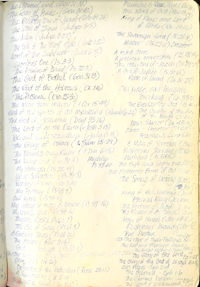Knowing God’s Will
It’s not enough to be in God’s will. We want to be in the center of God’s will for us.
No wonder we’re stressed. We have to find the one or discover our calling for work, locale, how many kids we should have, what we should name our dog.
I exaggerate. A little.
So how do we know God’s will? Let’s start with the basics. Not surprisingly, he revealed his will for us in Scripture.
It’s not enough to be in God’s will. We want to be in the center of God’s will for us.
No wonder we’re stressed. We have to find the one or discover our calling for work, locale, how many kids we should have, what we should name our dog.
I exaggerate. A little.
So how do we know God’s will? Let’s start with the basics. Not surprisingly, he revealed his will for us in Scripture.
"Then [Jesus] said to them all, “If anyone wants to become my follower, he must deny himself, take up his cross daily, and follow me" (Luke 9:23).
"Do not be conformed to this present world, but be transformed by the renewing of your mind, so that you may test and approve what is the will of God – what is good and well-pleasing and perfect" (Romans 12:2). (You can read my personal version of this here.)
"Therefore go and make disciples of all nations, baptizing them in the name of the Father and the Son and the Holy Spirit, teaching them to obey everything I have commanded you" (Matthew 28:19-20a).
"Jesus said to him, ‘"Love the Lord your God with all your heart, with all your soul, and with all your mind." This is the first and greatest commandment. The second is like it: "Love your neighbor as yourself"’" (Matthew 22:37b-39).
These are just a few of the commands we find in the Bible, but they give us a good place to start. God’s will for us is that we follow Christ (which requires all sorts of sacrifices), that we be transformed (or, as it says in Philippians, that we have Christ’s mind), that we bring others into God’s kingdom, teaching and discipling them that they may also be transformed, and that we love God and our neighbor (who is defined as anyone in need–whether friend or foe).
So as we make our decisions, we need to first ask these questions: How will this form me–in the world’s pattern or in God’s? (Will it develop in me the fruit of the Spirit?) How will this draw others to Christ? Will I be able to better minister to others? How does this decision love God and love others?
I often don’t like the application of these questions. While not becoming a masochist, I know that my transformation comes from persecution and perseverance. Ministering to and loving others means sticking with them when leaving is easier and more convenient. How often do we make decisions based on what’s better for our character and better for others?
That is the hard part. But within this, we have freedom. Next time, we’ll examine the freedom God gives us in practicing his will.
For those of you who missed it, you can read part one of our wisdom series here.


